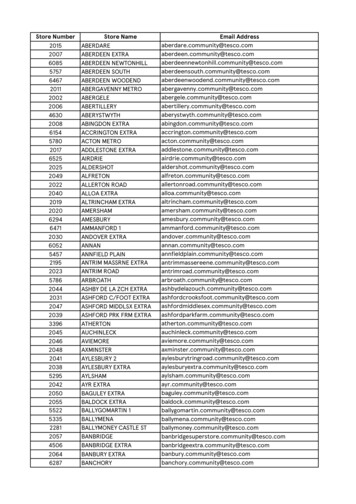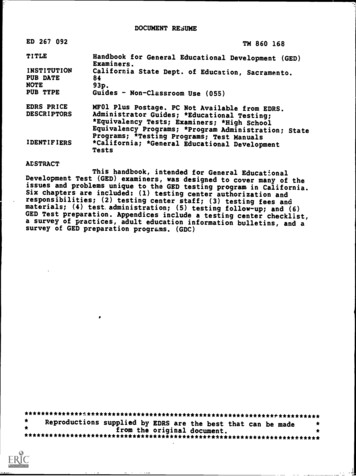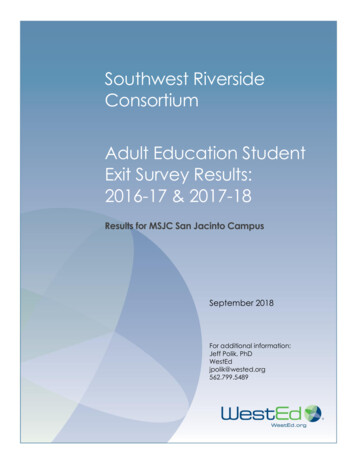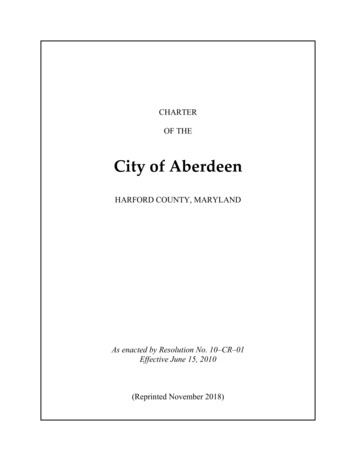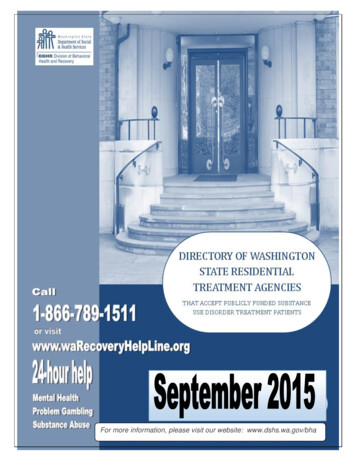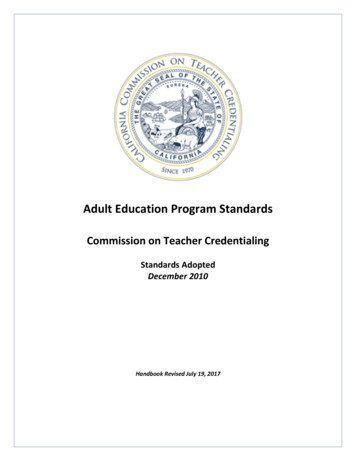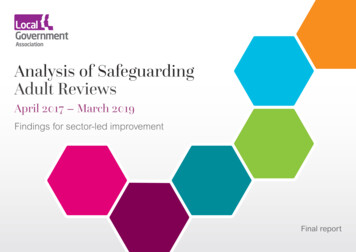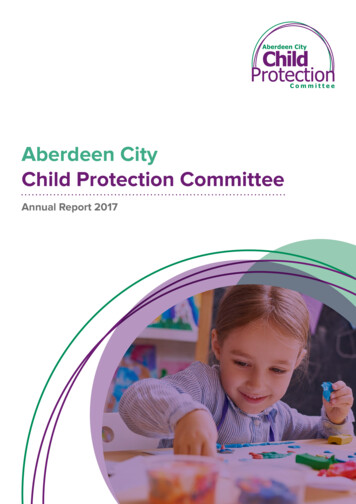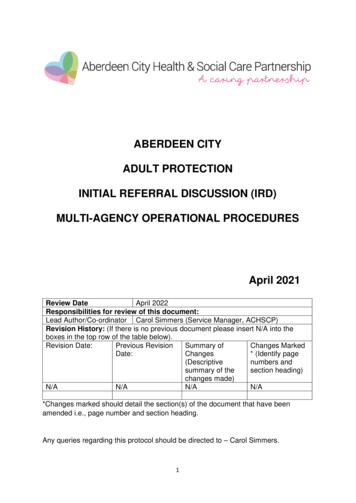
Transcription
ABERDEEN CITYADULT PROTECTIONINITIAL REFERRAL DISCUSSION (IRD)MULTI-AGENCY OPERATIONAL PROCEDURESApril 2021Review DateApril 2022Responsibilities for review of this document:Lead Author/Co-ordinator Carol Simmers (Service Manager, ACHSCP)Revision History: (If there is no previous document please insert N/A into theboxes in the top row of the table below).Revision Date:Previous RevisionSummary ofChanges MarkedDate:Changes* (Identify page(Descriptivenumbers andsummary of thesection heading)changes made)N/AN/AN/AN/A*Changes marked should detail the section(s) of the document that have beenamended i.e., page number and section heading.Any queries regarding this protocol should be directed to – Carol Simmers.1
ContentsPage Nos.What is an Interagency Referral Discussion?3When is an IRD initiated?3Who are the professionals involved?4What is the purpose of an IRD?4Flowchart of IRD Process5IRD Process – Health Guidance6IRD Process – Police Guidance7IRD Process – Local Authority Social Work8APPENDIX 1 - IRD Notification Template9APPENDIX 2 – CareFirst Stage 1 / IRD Form102
1. What is an Interagency Referral Discussion?1.1.An Interagency Referral Discussion (IRD) is the first stage in the formal processof multi-agency assessment. It is between two or more services / agencieswhere it is expected that an adult is at risk of harm or being harmed.1.2.This IRD protocol aims to:Improve multi-agency information gathering and sharing.critically analyse concerns and risk.contribute to a joint decision-making and the planning of an investigation.consider between relevant parties whether the adult needs protection.agree an adult-focused course of action.1.3.Each agency is responsible for populating their own information relevant to theconcerns identified in the appropriate section of the IRD Template.2. When is an IRD initiated?2.1.Having received a referral of concern, an IRD should be considered in thefollowing circumstances: The adult is at serious risk of harm and the decision is taken to proceedto ASP Investigation The need for multi-agency investigation/intervention/information isimmediately apparent The decision is made to progress to Large Scale Investigation A change of risks in an existing case that requires a high level ofintervention e.g. protection order The decision to proceed further under ASP procedures is considered‘borderline’ and would benefit from multi-agency consideration.An IRD is a legitimate mechanism for discussing situations where an adult hashad 5 separate adult support and protection reports in a rolling two-year periodthat have not resulted in any adult protection investigatory activity.2.2.Everyone involved in IRD activity must be aware of the principles of consentand information sharing in relation to adult protection concerns.2.3.The IRD should occur within 48 hours of the Referral being raised.2.4.Joint decisions as to whether to proceed to Investigation must always berecorded by the key agencies using the IRD template.3
2.5.A summary of the IRD should be provided as evidence of how the outcomesfrom the IRD were reached.4
3. Who are the professionals involved?3.1.In Aberdeen, the three key agencies who can initiate and take part in IRDsare:Police Scotland.NHS Grampian; andThe relevant local authority social work team responsible for adultprotection screening.3.2.Professionals involved in IRDs must be sufficiently senior to assess anddiscuss available information and make decisions on behalf of their agenciesand must have access to agency guidance, training, and supervision inrelation to this role.3.3.Having received a referral of significant concern requesting an IRD will notdelay the need for immediate action when protective measures are required tosecure the safety of the adult. An IRD will be convened as soon as isreasonably practicable.3.4.Information should be clear and concise as to where the risks, if any, exist.This should not be a cut and paste but should be a synopsis of relevantinformation.4. Purpose of an IRD4.1.An IRD is not a case conference or a professionals meeting. Its purpose is tofacilitate and support the sharing of relevant information to support initialdecision making about an adult at risk and their circumstances.4.2.An IRD should include, as part of the multi-agency discussions:Summary of the Concern Report / ReferralConfirm any immediate action taken to protect the adult.Information shared by Police Scotland, NHSG and Social WorkDetermine whether a police investigation is required, if criminality issuspected.Determine if an ASP Investigation is required e.g., individual or large scale.Summary of IRD DiscussionRestricted Information must be recorded.Actions agreed e.g., immediate actions taken to protect the adult.Date of ASP Case Conference [max. 4 weeks from date of IRD]Consider alternative (non-ASP) support and protective measures.Assigned to / Outcomes Details / Date of completion.Outcome of IRD must be considered and recorded on appropriate proforma and a written record supplied to each participant.5
Adult Protection Unitreceives Concern Report/ Referral6
5.Initial Referral Discussion Process – Health Guidance5.1. The local authority will contact the nominated Health Single Point of Contact(SPoC) within the relevant Health and Social Care Partnership.5.2. The SPoC will check health records to ascertain if the potential adult at risk isknown to any NHS professionals/teams. This could be community nursingteams, community psychiatric nurses, allied health professionals, learningdisability nursing, and integrated alcohol/drug service staff, amongst manyothers.5.3. GP’s will not be the default professional for attending IRD’s – however may bethe correct professional to attend if they have had significant involvement withthe adult at risk or are the only professional involved.5.4. The SPoC will contact the relevant NHS professional and inform them that anIRD is required and give the details of the adult at risk. The professionalidentified by the SPoC will now be referred to as the IRD Responder. The IRDResponder will then inform the local authority social work department of theirname and details their availability to attend an IRD – this will occur within 24hours of contact, to ensure there is no overall delay in scheduling the IRD.5.5. If the SPoC is unable to source, for any reason, an appropriate IRD Responder,they should escalate to the NHS Grampian Public Protection Team immediately.5.6. The local authority social work department will schedule the IRD and sendjoining instructions to the IRD Responder for the meeting. The IRD meeting willoccur by telephone or virtual session and will last no longer than 20 minutes.5.7. Prior to this meeting, the IRD Responder will have checked relevant healthrecords to establish if there is any relevant information that supports theconsideration of the adult support and protection report. The IRD Respondermay also contact other health professionals who could have relevantinformation to inform the IRD.5.8. The IRD Responder will participate in the IRD, sharing relevant healthinformation and participate in discussions around next steps – ensuring theadults’ health needs are fully considered.5.9. The IRD Responder will record the IRD has happened in the adult’s healthrecords.5.10. An IRD record will be provided by the local authority social work team to boththe adult at risk’s GP and the IRD Responder (if different). When received thisshould be added to the adult at risks health records.7
6.Initial Referral Discussion Process – Police Guidance6.1. Adult Protection Network e-mails an IRD notification toIRDNorthEast@scotland.pnn.police.uk following up with a phone call (01224306918) in the case of urgent requests.6.2. The IRD request will indicate: The name and date of birth of the adult and other significant involved people The purpose of the request for information The requested time of the IRD teleconference or MS Teams Meeting.6.3. The Police Officer receiving the IRD request should nominate a named staffmember to progress the IRD (Police IRD Responder). Any issues with thisshould be highlighted at this time.6.4. The Police IRD Responder will carry out relevant research of Police systemswith the information being available at IRD.6.5. The presumption of Police attendance will be applied to all IRDs, however incertain circumstances where Police are unlikely to be required in the decisionmaking process, it may be acceptable to share Police research with the leadagency and consult with them regarding the requirement for Police attendance.Unless agreed otherwise with the lead agency, Police will attend all IRDs.6.6. The nominated Police Officer will take part in the teleconference, sharingrelevant information and take part in discussion around next steps.6.7. If a criminal investigation is required, discussion will occur about the impact onthe ASP process. The Police IRD Responder will ensure any criminalinvestigation is undertaken timeously.6.8. Police participation at an ASP IRD should be recorded via a VPD entry. Thisshould document what information was shared and what actions will be takenbecause of the IRD.6.9. In all cases a written IRD record will be provided by the lead agency within 24hours.6.10. If a Case Conference date is agreed, the Police IRD Responder will direct thatinvitations be sent via the Concern Hub as per existing arrangements forattendance to be facilitated.8
7. Initial Referral Discussion Process – Local Authority Social Work7.1. Local Authority Social Work receive the Concern Report and make decision ifan IRD is required and allocate an IRD responder.Senior unsure if adultmeets criteria andconsiders an IRDConcern Reportreceived by the AdultProtection Unit.Concern Reportreturned to AdultProtection withrequest for IRDConcern Report loggedand passed to Senior of“best fit” team forscreening.APU Co-Ordinator(IRD Responder) ismade aware andstarts the IRD process.NB this will need update once APU and Duty Team have merged7.2. Local Authority Social Work sends IRD notification email to Health and Police –see Appendix 1.7.3. The IRD notification template (Appendix 1) will indicate: The name and date of birth of the adult and other significant involved people The reason an IRD is occurring. A request to Health to set time/date for IRD to occur. The target will be for theIRD to occur within 48 hours of the notification being sent.7.4. The Local Authority Social Worker responsible for the IRD will check electronicfiles and contact any SW professional (currently involved, community and acuteservices) to establish if there is any additional information held that supports theadult protection IRD process.7.5. The Local Authority Social Worker will gather information from any otherrequired professional or non-professional which would support the IRDdiscussion e.g., Care Inspectorate, Housing, Office of the Public Guardian, 3rdSector organisation, carer. This information will be collated onto a new Stage 1 /IRD form in CareFirst – see Appendix 2.7.6. Upon receipt from the Health IRD Responder of a date/time for the IRD, theLocal Authority Social Worker will send joining instructions to IRD participantsfor the IRD meeting. The IRD meeting will be by Microsoft Teams and will lastno longer than 20–30 minutes.7.7. The Local Authority Social Worker will facilitate the IRD, sharing relevantinformation, and take part in discussion around next steps.7.8. Local authority Social Worker notifies appropriate Social Work Team of outcomeand records in CareFirst.9
APPENDIX 1IRD Notification Template [48 hrs notification] Aberdeen City1. Date & Time & LocationDate:Time:Location:2. Adult at RiskAdult at Risk:Date of Birth:Age:Gender:Telephone Number:Category of Abuse:3. Others involved.Adult:Date of Birth:Address:Telephone Number:Relationship to adult:Suspect / person of interest:Date of Birth:Address:Telephone Number:Relationship to adult:4. Reason for IRDReason for IRD:5. Referral to Health to set time and date.Date of request:Date for IRD to occur:Time for IRD to occur:10
APPENDIX 2ASP - IRD SummaryForm Start Date:Worker Name:Person DetailsName:CareFirst ID:DoB / EDD:Gender:Address:Tel No:IRD SummaryDate of IRDProfessionals involvedSummary of referralInformation shared by Police ScotlandInformation shared by Health ProfessionalsInformation shared by Social WorkSummary of IRD discussionRestricted information11
APPENDIX 2ASP - IRD SummaryName:CareFirst ID:Outcome of IRDActions agreedFor Example:- Any immediate actions required to protect the adult:- Name of Council Officer:- Name of APCC Chair:- Details of advocacy involvementDate of case conferenceCase conference activityStatus: Newly GeneratedStatus Date: Date of IRDRequested Date: Date of IRDRequired by Date: Agreed date of Case Conference (max 4 weeks from date of IRD)Assigned To:Status:Status Date:Requested Date:Required by Date:Priority:Details:Outcome DetailsOutcome Date:Outcome:Outcome Reason:CompletionCompleted By:Date:Worker:Tel:Address:12
The IRD Responder will record the IRD has happened in the adult's health records. 5.10. An IRD record will be provided by the local authority social work team to both the adult at risk's GP and the IRD Responder (if different). When received this should be added to the adult at risks health records.

